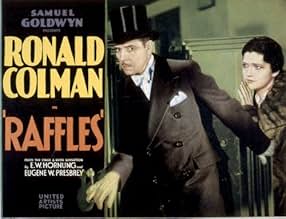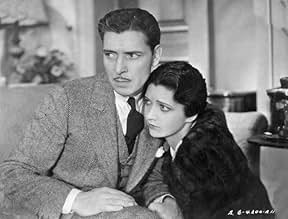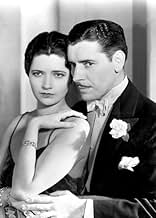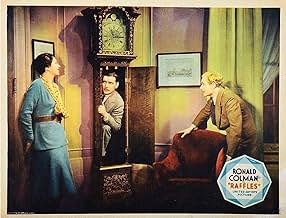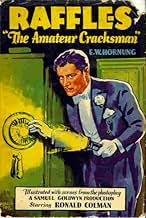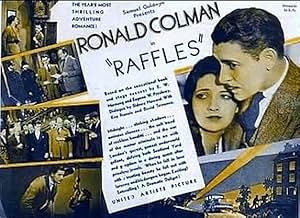Raffles
- 1930
- 1h 12min
Agrega una trama en tu idiomaA distinguished English gentleman has a secret life--he is the notorious jewel thief the press has dubbed "The Amateur Cracksman". When he meets a woman and falls in love he decides to "reti... Leer todoA distinguished English gentleman has a secret life--he is the notorious jewel thief the press has dubbed "The Amateur Cracksman". When he meets a woman and falls in love he decides to "retire" from that life, but an old friend comes to him with a predicament that entails him com... Leer todoA distinguished English gentleman has a secret life--he is the notorious jewel thief the press has dubbed "The Amateur Cracksman". When he meets a woman and falls in love he decides to "retire" from that life, but an old friend comes to him with a predicament that entails him committing one last job.
- Dirección
- Guionistas
- Elenco
- Nominado a 1 premio Óscar
- 2 premios ganados y 1 nominación en total
- Lord Harry Melrose
- (as Frederic Kerr)
- Lord Melrose's Butler
- (sin créditos)
- Harry - Lord & Lady Melrose's Friend
- (sin créditos)
- Gwen's Friend
- (sin créditos)
- Party Guest
- (sin créditos)
- Dirección
- Guionistas
- Todo el elenco y el equipo
- Producción, taquilla y más en IMDbPro
Opiniones destacadas
In the 1939 version, maybe because of the code, Raffles is a Robin Hood type who robs for the excitement and fun of it but then helps someone in need with the money or returns the merchandise. In this version, he steals, period, and in fact presents Gwen with a bracelet from one of his crimes. This film skips the whole beginning of the '39 film showing Raffles' acts of kindness, but the rest of the story is the same. Raffles decides to retire and start life anew with Gwen, but his friend Bunny shows up with a gambling problem and needs to cover a 1000 pound check by Monday. Raffles, alas, needs to do one more job.
Ronald Colman is delightful as Raffles, dashing, charming, and handsome as he cleverly attempts to escape the clutches of Scotland Yard. It's a wonderful role for him, as it was for David Niven in 1939. Kay Francis is wasted but is a good match for Coleman.
Fun film with a fine performance by Colman.
Raffles has been a reformed ex-Cracksman for a few hours but finds he suddenly has to help his limp friend Bunny repay £1000 within 2 days and he only knows one way to get it. An invite to Lady Melrose's country house for cricket and a garden party of hundreds provides him with the chance and also a gang of six ineffectual Cockney burglars who skulk around in the dark loudly laying their plans. The scene where the burglar is caught and venomously points out Raffles on the stairs is pivotal to the film but it never recovers from the clumsy handling of it did Colman know what to say at that point? Colman was great in the role, his clipped accent and perfect diction usually used to good effect. Good support was from Kay Francis who played his understanding girlfriend although she didn't get to say Divine, and David Torrence the chunky and heavily cloaked Scotland Yard Inspector. Favourite bit: the torchlit confrontation between Raffles and Crawshay in the bedroom at midnight.
Simple old fashioned entertainment - I stick it on every few years without fail because with all its faults I like this one.
Raffles the English gentleman has a discreet sideline as a burglar and jewel thief. The press has dubbed him 'The Amateur Cracksman', and as such he has become a household name. Now that he has fallen in love with the sophisticated Gwen (Kay Francis) and proposed marriage to her, Raffles has decided to retire from crime. However, his old pal Bunny is in a spot of bother. Bunny has been playing cards again, and has run up a gambling debt of £1,000. If Bunny is to be rescued from his predicament, Raffles will have to take on the Melrose 'job' ...
Ronald Coleman gives us his trademark suave Englishman in the title role. We see him burgling a jeweller's shop wearing a top hat (note the excellent Toland touch of the policeman silhouetted against the window drape). Our first real glimpse of the hero comes on the dance floor as he sweeps Gwen around in a romantic waltz. On the cricket field at Lord Melrose's place, Raffles is of course dashing, and wins the game (even though he was not supposed to be playing - he invited himself along for the weekend at the last minute). Even when Inspector Mackenzie has him on the ropes, Raffles remains the epitome of poise and wit.
"All bubbles and froth - no taste," says Lord Melrose, giving his verdict on champagne. It is a reasonable comment on the film itself, which for all its pretensions to style is basically an inelaborate crime flick. We have the 'two Englands' crudely juxtaposed - one urban and ugly (the cloth-capped burglars from the pub, the 'pea soup' fog in London) and the other bucolic and 'refayned' (Lady Melrose's soiree). The film takes it for granted that the lower classes are unpleasant.
However, there are good things in this movie. The cricket match is fun, and tolerably well done, though Raffles' bowling action is highly dubious and the umpire's position would make lbw decisions interesting to say the least. The skylight scene on Raffles' apartment roof is an arresting image.
There is also a large portion of baloney. Does Scotland Yard protect country houses against burglary? Is this best done by surrounding them with a dozen detectives throughout the night? Why don't these detectives catch the various burglars who enter the premises? If closing the sash window is enough to stop the burglar alarm from ringing, then it isn't much of a burglar alarm. The 'common' burglars crouch in the shrubbery and talk aloud, spelling out their plans in pedantic detail, conveniently allowing Raffles to overhear. Is it not slightly more probable that they would have worked out what to do before entering the property?
The film ends in a flurry of increasingly silly activity. Blatant undercranking of the camera makes Raffles' escape dash look ridiculous, and his place of concealment is laughable.
Verdict - An enjoyable crime caper with absurd elements.
The Raffles stories were extremely popular and have been the subject of many film, theater, and television treatments. One of the best of these is this 1930, very early talkie starring cinema's quintessential English gentleman, Ronald Coleman. It's really quite a good film for its time, with an intelligent script, generally good acting (especially by Coleman and character actor Frederick Kerr, better known as Baron Frankenstein in James Whale's famous 1931 treatment of the monster story, who steals every scene he is in as a grouchy English lord.) Co-cinematographer Gregg Toland, who later worked on many Hollywood classics, is presumably responsible for the film's noirish, atmospheric lighting effects.
All in all, I'd say this entertaining film will still be enjoyed by today's audiences, and is a must see for fans of Coleman.
Ah, but it stars 'The Voice', Ronald Colman, and that makes all the difference. Colman and his mellifluous voice glide through every scene and anesthetizes an unbelievable story just by talking. Here he was at the height of his popularity as the dashing cricketer/thief and has as his leading lady Kay Francis, one of the loveliest stars of that era. She is unfortunately given little to do in a meager role as his fiancé. But there are some other Hollywood stalwarts in the cast, among them Alison Skipworth in one of her ditzy socialite roles and silent film bad guy David Torrence, a Scotsman with a thick Scottish accent, as the investigating detective. Also Bramwell Fletcher and Frederick Kerr, a very elderly gentleman I found delightful in "Waterloo Bridge (1930)" in the same blustery, old duffer-type role.
"Raffles" is uncomplicated and good fun, and about as deep as a dish of water, but worth your time to see and hear Colman say things - doesn't matter what, just listen to him talk. Thank TCM for dusting this one off.
¿Sabías que…?
- TriviaThe last Samuel Goldwyn movie to be shot simultaneously in silent and talkie versions.
- ErroresWhen the alarm goes off and the cat burglar is attempting to escape, Bunny's bedroom windows are show to be wide open, which would have prevented the alarm being set in the first place.
- Citas
Inspector McKenzie: Good heavens! In the tobacco! Well, I'll be...
A.J. Raffles: Yes, I thought that you would be.
- Versiones alternativasRaffles (1930) was made simultaneously in silent and talking versions. With almost all the theaters in the USA wired for sound, this was to be the last film that Samuel Goldwyn produced in this manner.
- ConexionesReferenced in The Devil Is a Sissy (1936)
- Bandas sonorasThe Blue Danube
(uncredited)
Written by Johann Strauss
Heard when Raffles takes Lady Melrose to her room.
Selecciones populares
- How long is Raffles?Con tecnología de Alexa
Detalles
Taquilla
- Total en EE. UU. y Canadá
- USD 1,000,000
- Tiempo de ejecución
- 1h 12min(72 min)
- Color
- Mezcla de sonido
- Relación de aspecto
- 1.20 : 1

